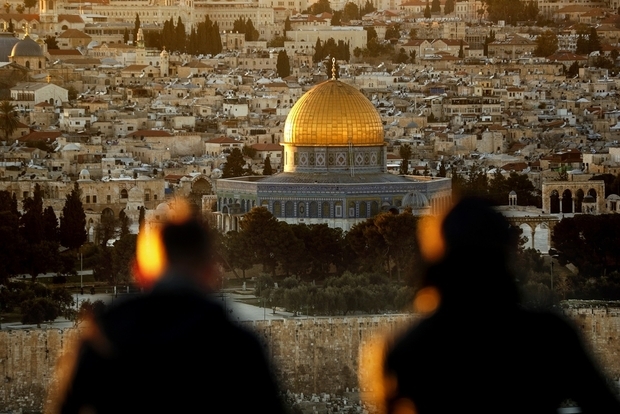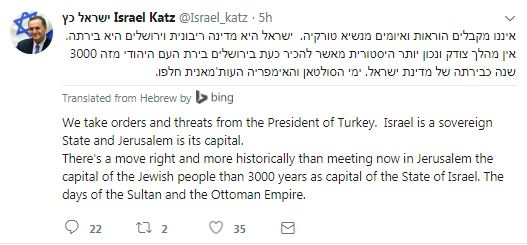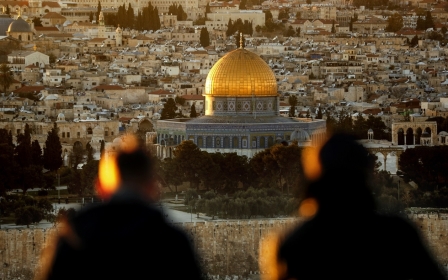Trump tells Abbas he will move embassy to Jerusalem

Donald Trump reaffirmed to Palestinian President Mahmoud Abbas on Tuesday that he intends to move the US embassy to Jerusalem, as regional and world leaders reiterated the dangers of the vow, a decision on which is expected in the coming days.
The US president confirmed his "intention" to move the embassy in a phone call with his Palestinian counterpart, the latter's spokesman Nabil Abu Rdainah said.
The spokesman said Abbas was not informed about the timing of the planned transfer of the embassy from Tel Aviv to Jerusalem.
"President Abbas spoke after his call with President Trump with the presidents of Russia and France, with the Pope and with King Abdullah of Jordan. He told them such a move was rejected and he urged them to intervene to prevent it from happening," Abu Rdainah told Reuters.
Palestinian groups in the West Bank announced three "days of rage" against the move, starting on Wednesday, according to a Haaretz report on Tuesday.
Haaretz added that the Palestinian Authority (PA) support the anticipated large protests.
Turkey threatened to cut diplomatic ties with Israel should the country become the first to recognise Jerusalem as the capital of Israel.
"Mr Trump, Jerusalem is the red line of Muslims," Turkey's President Recep Tayyip Erdogan told a parliamentary meeting of his ruling AK Party.
"This can go as far as severing Turkey's ties with Israel. I am warning the United States not to take such a step which will deepen the problems in the region."
In his address, Erdogan warned that any move to back Israel's claim to the city would mobilise "the entire Islamic world”.
Saudi King Salman told Trump that any decision to move the US embassy in Israel to Jerusalem before a permanent peace settlement is reached will inflame the feelings of Muslims, Saudi state-owned media said on Tuesday.
It said that King Salman had received a telephone call from Trump about developments in the region and the world.
"The Custodian of the Two Holy Mosques asserted to His Excellency the US president that any American announcement regarding the situation of Jerusalem prior to reaching a permanent settlement will harm peace talks and increase tensions in the area," state news agency SPA said.
It quoted King Salman as saying that Saudi Arabia supported the Palestinian people and their historic rights and asserted that "such a dangerous step is likely to inflame the passions of Muslims around the world due to the great status of Jerusalem and the al-Aqsa mosque".
Hamas chief Ismail Haniya warned on Tuesday that a US decision to move its embassy to Jerusalem and recognise the city as Israel's capital would be a "dangerous escalation" that crosses "every red line".
"The American administration's recognition of occupied Jerusalem as the occupation's capital and moving its embassy to Jerusalem crosses every red line," the head of the Palestinian Islamist movement, which runs the Gaza Strip, said in a letter to Arab and Muslim world leaders.
"Moving the American embassy to Jerusalem is a dangerous escalation and provides cover for the extremist government of (Prime Minister Benjamin) Netanyahu to carry out its plan to Judaize the city of Jerusalem."
Jordan's King Abdullah also told Trump on Tuesday that any move by the United States to declare Jerusalem the capital of Israel would have "dangerous repercussions" for regional stability, a Jordanian palace statement said.
Trump said he intended to go ahead with a decision to move the embassy in a phone call to the king, according to the palace.
Jordanian Foreign Minister Ayman al-Safadi said his country planned to convene emergency meetings of the Arab League and Organisation of Islamic Cooperation next Saturday and Sunday on how to face the "dangerous" consequences of a US decision.
Trump had been due to take a decision on the Holy City on Monday, but delayed it by several days following a string of public and private warnings from leaders around the globe.
The suggestion that Trump could be poised to reverse years of US policy over Jerusalem has prompted a furious bout of Palestinian lobbying.
All foreign embassies are located in Tel Aviv with consular representation in Jerusalem. Trump had been expected on Monday to decide whether to sign a legal waiver that would delay by six months plans to move the US embassy.
"No action though will be taken on the waiver today and we will declare a decision on the waiver in the coming days," White House spokesman Hogan Gidley said on Monday.
But he insisted the move would eventually happen.
"The president has been clear on this issue from the get-go: It's not a matter of if, it's a matter of when."
Another option under consideration, officials have said, is for Trump to order his aides to develop a longer-term plan for the embassy’s eventual relocation.
However it is unclear whether any public recognition by Trump of Israel’s claim on Jerusalem would be formally enshrined in a presidential action or be more of a symbolic statement.
US officials and allies express concern
Senior US officials told Reuters some officers in the State Department were also deeply concerned, and the European Union, Saudi Arabia and the Arab League all warned any such declaration would have wide repercussions across the region.
A senior US official told Reuters last week that Trump was likely to make the announcement on Wednesday, though his adviser and son-in-law Jared Kushner said over the weekend no final decision had been made.
Such a decision would break with decades of US policy that Jerusalem's status must be decided in negotiations.
The US ordered government employees to avoid Jerusalem's Old City and the West Bank on Tuesday following calls for protests, as speculation mounted over the decision to move the embassy.
"With widespread calls for demonstrations beginning December 6 in Jerusalem and the West Bank, US government employees and their family members are not permitted until further notice to conduct personal travel in Jerusalem's Old City and in the West Bank," an advisory from the US State Department said.
"Official travel by US government employees in Jerusalem's Old City and in the West Bank is permitted only to conduct essential travel and with additional security measures."
Israel occupied Arab East Jerusalem in the 1967 Middle East war. It later annexed it, declaring the whole of the city as its capital. The declaration is not recognised internationally and Palestinians want it as the capital of their future state.
Israel's prime minister, Benjamin Netanyahu, has so far declined to speculate on what Trump might say.
But Israel Katz, minister of intelligence and transport, took to Twitter to reject Turkey's threat and reiterate Israel's position on the city.
"We don't take orders or accept threats from the president of Turkey," he wrote.
"There would be no more righteous or proper an historical move now than recognising Jerusalem, the Jewish people's capital for the past three thousand years, as the capital of the State of Israel."
'Playing with fire'
Two US officials said on condition of anonymity that news of the plan to recognise Jerusalem as Israel's capital had kicked up resistance from the State Department's Near Eastern Affairs bureau (NEA), which deals with the region.
"Senior (officials) in NEA and a number of ambassadors from the region expressed their deep concern about doing this," said one official, saying that the concerns focused on "security".
The State Department referred questions to the White House. The White House did not immediately respond to requests for comment.
A fourth US official said the consensus on recognition of Jerusalem as Israel's capital was that it would risk triggering a backlash against Israel, and also potentially against US interests in the Middle East.
A fifth US official said concerns of Palestinian and other Arab leaders about endorsing Israel's claim to Jerusalem were being taken into account, but no final decisions had been made.
Daniel Benjamin, a former US counter-terrorism official now at Dartmouth University, had a simple message: "This is playing with fire.”
US allies added their warnings.
The European Union's top diplomat, Federica Mogherini, said on Tuesday that "any action that would undermine" peace efforts to create two separate states for the Israelis and the Palestinians "must absolutely be avoided".
Speaking alongside US Secretary of State Rex Tillerson in Brussels, she said Jerusalem's status would have to be agreed through negotiations.
If Mr Trump really tomorrow or the day after tomorrow comes up and says that 'I recognise united Jerusalem to be the capital of the state of Israel' he has destroyed every chance that he will play to get the deal of the century that he has been talking about
- Nabil Shaath, adviser to Palestinian President Mahmoud Abbas
The EU's 28 foreign ministers will discuss the matter with Netanyahu in Brussels next Monday, to be followed by a similar meeting with Palestinian President Mahmoud Abbas early next year, she added.
Nabil Shaath, an adviser to Abbas, told journalists gathered on the outskirts of Jerusalem near Bethlehem that any announcement along those lines would wreck peace efforts.
"If Mr Trump really tomorrow or the day after tomorrow comes up and says that 'I recognise united Jerusalem to be the capital of the state of Israel' he has destroyed every chance that he will play to get the deal of the century that he has been talking about," Shaath said.
New MEE newsletter: Jerusalem Dispatch
Sign up to get the latest insights and analysis on Israel-Palestine, alongside Turkey Unpacked and other MEE newsletters
Middle East Eye delivers independent and unrivalled coverage and analysis of the Middle East, North Africa and beyond. To learn more about republishing this content and the associated fees, please fill out this form. More about MEE can be found here.





